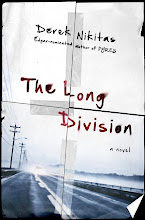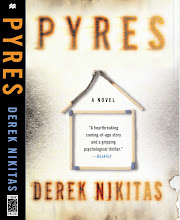I don’t go to the movies much. Even when it’s something I desperately want to see. Can’t justify the cost. Only P.T. Anderson and the Coen Brothers have lured me to the theater this year—There Will Be Blood and No Country For Old Men, respectively. Both fantastic films, the latter being the clear victor, as the Academy rightly noted last week. I loved There Will Be Blood, no question. I especially like that PT pulled off what I thought impossible: making oil prospecting interesting. But there were a few slow moments, and the end—well, another risky ending on PTs part that doesn’t quite come off as brilliantly as the frog rain in Magnolia. The end of There Will Be Blood felt too much like a punchline to something I didn’t think was a joke. “I’m finished.” Ha, ha,
Friday, February 29, 2008
Can You Do a .357 With a Bayonet?
Posted by
Derek Nikitas
at
2:15 PM
2
comments
![]()
Wednesday, February 20, 2008
Come on, Chemicals
"Hemidalsgate like a Promethean Curse"
from Hissing Fauna, Are You The Destroyer?
Another recent favorite, and my vote for best video since, well--for a very, very long time. I love a band that can write a great pop song with a sense of humor that stretches the genre, yet with lyrics that actually resonate, especially for a writer with concerns about melancholy and the natural chemical processes that affect it. "Chemicals, don't strangle my pen..."
I'm in a crisis
I need help
Come on mood shift, shift back to good again
Come on mood shift, shift back to good again
Come on, be a friend
Nina Twin is trying to help, and I
Really hope that she succeeds
Though I picked the thorny path myself
I'm afraid, afraid of where it leads
Chemicals, don't strangle my pen
Chemicals, don't make me sick again
I'm always so dubious of your intent
Like I can't afford to replace what you've spent
Nina Twin is trying to help, and I
Really hope she gets me straight
Because my own inner cosmology
Has become too dense to navigate
I'm in a crisis
I need help
Come on mood shift, shift back to good again
Come on mood shift, shift back to good again
Come on, be a friend
Chemicals, don't flatten my mind
Chemicals, don't mess me up this time
Know you bait me way more than you should
And it's just like you to hurt me when I'm feeling good
Come on chemicals
Posted by
Derek Nikitas
at
10:28 AM
0
comments
![]()
Aspects of the Blog
E.M Forster’s wrote Howard’s End and A Passage to India. He’s (post)Edwardian, which means early 20th Century. He gets lumped in with the Modernists sometimes because he was writing round the same time as James Joyce and Virginia Woolf, but he’s much more traditionalist (i.e. Victorian). Not much in the way of wacky formal experiments for Forster. He respected wacky formal experiments, even if he didn’t indulge himself.
Anyway, with plot, cues and clues lead us to further revelation and realizations. What happened before the story begins is gradually revealed as the story itself progresses. In that basic sense, two “stories” form a plot (this, by the way, is the basic structure of most mysteries). You have the story that unfolds chronologically from the discovery of the body to the punishment of the murderer. But you also have the other story, often broken out of its chronology and sprinkled throughout the chronological story, of what happened before the body is found—the story behind the murderer’s motivation, the exposition.
Posted by
Derek Nikitas
at
10:11 AM
2
comments
![]()
Labels: Aspects of the Novel, Derek Nikitas, E.M. Forster, Fantasy, Prophecy
Tuesday, February 12, 2008
Some Ecstasy from the Agony
Anyway, the D'Auray review heralds the second time I've been compared to John Connelly, whom I have admittedly not yet read, even though his novel Every Dead Thing begins with an epitaph from John Donne's poem, "A Nocturnal Upon St. Lucy's Day, Being The Shortest Day," being the poem from which Connelly took his titular phrase. For reasons clear to those who've read Pyres, I would've used that same epitaph to begin my book, had not Mr. Connelly beat me to the punch. Do I hold a grudge? Of course not!
I must also admit I've not heard of this wonderful website, "The Agony Column..." until today, and this is my own internet ignorance. I'm out of every loop. What I've discovered is not only an amazing repository of reviews, but also an archive of audio interviews and podcasts that are going to keep me glued to my RealPlayer for days.
I also want to thank Amazon Top 1000 reviewer Gary Griffiths for his review of Pyres. Gary lives in Cali. I seem to be getting an inordinate amout of love from California, a state far removed from my (not to mention my characters') stomping ground. The folks at the M is for Mystery bookstore in San Marcos, CA have been amazing advocates of the book, as has Tzar of Noir Eddie Muller in his San Fran Chron review. Here's hoping the love makes its way down to Hollywood.
Meanwhile, the folks at Barnes and Noble have been far too good to me. This link will probably expire soon, but just take a gander if you're reading this and it's still Feb 2008. Scroll down, of course.
Okay, enough love. You can't ego-google and expect everything to come up roses. This guy thinks my book is suffocating, and I agree. I thought thrillers were supposed to be suffocating. I'll try better next time.
And worse: my supposed friend Craig Renfroe has publically accused me of stealing propagan... I mean property from the Paddington, London branch of the Church of Scientology. I am innocent. Kelly and Sarah are the culprits, as he well knows. I merely suggested it. I even felt guily (and curious) enough to go get a free audit, which, for the record, did not make me feel better, but now permits the Scientologists to "have a file on me," as it were. Anyway, this kind of unwarranted accusation and aspersion-casting will never bring you to a state of theta clear, as you also well know, Craig. May Xenu and the Galactic Confederacy show you no mercy.
Posted by
Derek Nikitas
at
3:09 PM
0
comments
![]()
Labels: Agony, Craig Renfroe, Derek Nikitas, Eddie Muller, John Connelly, John Donne, M is for Mystery, Pyres, Scientology, Terry D'Auray, The Eels
Saturday, February 9, 2008
Final Fantasy: This is the Dream of Win and Regine
Posted by
Derek Nikitas
at
7:02 AM
1 comments
![]()
Labels: Arcade Fire, Final Fantasy, Owen Pallett
Don't Fall in Love With Your Tapeworm
Weekly short story workshop at college interrupted by a fire drill. Two hundred English-major mopes expelled from the hallowed hall, now slouching around the quad waiting for the all-clear. We’re huddled in a circle of writers: Peter, me, Karen, Melissa, Sarah. It’s like fifty, cold for
E.M. Forster, a Brit, (even worse than a NE Proddy) recommends the following regretful attitude: “Yes—oh, dear, yes—the novel tells a story. That is the fundamental aspect without which it could not exist. That is the highest factor common to all novels, and I wish that it was not so, that it could be something different—melody, a perception of the truth, not this low atavistic form.” (emphasis mine, but the quote is his, from Aspects of the Novel).
For Forster, any idiot can throw together a story, a narrative to keep the reader guessing. For God’s sake, cavemen could fucking do it. Anybody who’s proud of the plot he’s fashioned might want to consider what source he stole it from. The cutest metaphor Forster can devise for story is a tapeworm: “For the more we look at the story. . . the more we disentangle it from the finer growths that it supports, the less shall we find to admire. It runs like a backbone—or may I say a tapeworm, for its beginning and end are arbitrary. . . . It is the lowest and simplest of literary organisms.”
Granted, Forster makes some distinction between story and plot, but he’s still got his point. It’s the “melody. . . perception of truth . . . the finer growths” that matter. Those I love: those stream of language that work better than any plan I could’ve made, those resonances of imagery or character that I could not have anticipated, those truths I didn’t know were true until a character told me so.
I’m not saying I don’t control my characters. I admit, I’m one of those goddamn plodding plotters. But when I can I let my characters think and emote for themselves, and sometimes I love what they show me. It’s not something I create, it’s just something I notice only after it appears. Where it comes from? Not a clue, but it ain’t me, and I don’t love what I alone can do.
Posted by
Derek Nikitas
at
6:51 AM
1 comments
![]()
Labels: Aspects of the Novel, Derek Nikitas workshop, E.M. Forster, Judith Kitchen, tapeworm


